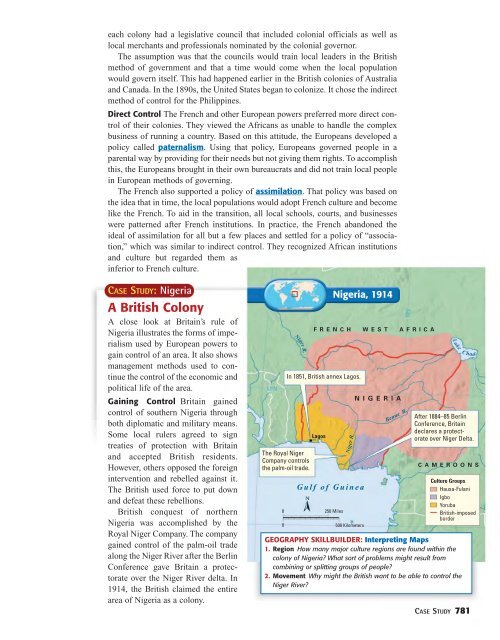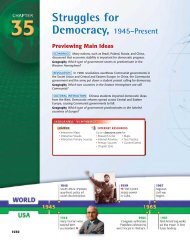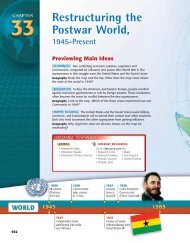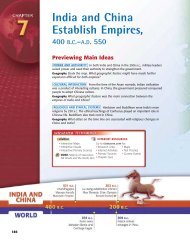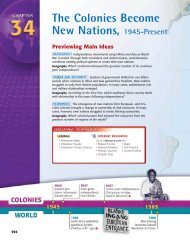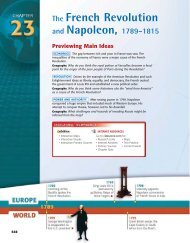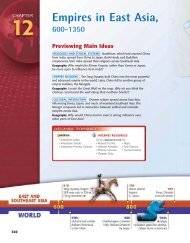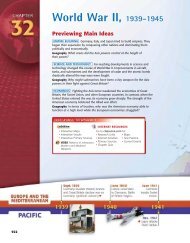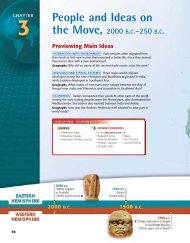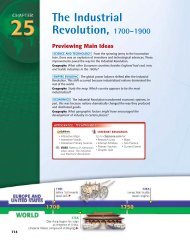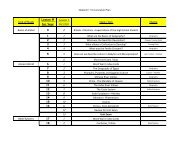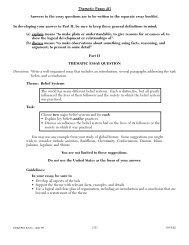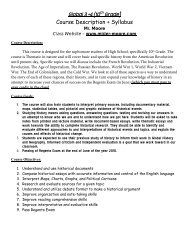The Age of Imperialism, - First
The Age of Imperialism, - First
The Age of Imperialism, - First
Create successful ePaper yourself
Turn your PDF publications into a flip-book with our unique Google optimized e-Paper software.
each colony had a legislative council that included colonial <strong>of</strong>ficials as well as<br />
local merchants and pr<strong>of</strong>essionals nominated by the colonial governor.<br />
<strong>The</strong> assumption was that the councils would train local leaders in the British<br />
method <strong>of</strong> government and that a time would come when the local population<br />
would govern itself. This had happened earlier in the British colonies <strong>of</strong> Australia<br />
and Canada. In the 1890s, the United States began to colonize. It chose the indirect<br />
method <strong>of</strong> control for the Philippines.<br />
Direct Control <strong>The</strong> French and other European powers preferred more direct control<br />
<strong>of</strong> their colonies. <strong>The</strong>y viewed the Africans as unable to handle the complex<br />
business <strong>of</strong> running a country. Based on this attitude, the Europeans developed a<br />
policy called paternalism. Using that policy, Europeans governed people in a<br />
parental way by providing for their needs but not giving them rights. To accomplish<br />
this, the Europeans brought in their own bureaucrats and did not train local people<br />
in European methods <strong>of</strong> governing.<br />
<strong>The</strong> French also supported a policy <strong>of</strong> assimilation. That policy was based on<br />
the idea that in time, the local populations would adopt French culture and become<br />
like the French. To aid in the transition, all local schools, courts, and businesses<br />
were patterned after French institutions. In practice, the French abandoned the<br />
ideal <strong>of</strong> assimilation for all but a few places and settled for a policy <strong>of</strong> “association,”<br />
which was similar to indirect control. <strong>The</strong>y recognized African institutions<br />
and culture but regarded them as<br />
inferior to French culture.<br />
CASE STUDY: Nigeria<br />
A British Colony<br />
A close look at Britain’s rule <strong>of</strong><br />
Nigeria illustrates the forms <strong>of</strong> imperialism<br />
used by European powers to<br />
gain control <strong>of</strong> an area. It also shows<br />
management methods used to continue<br />
the control <strong>of</strong> the economic and<br />
political life <strong>of</strong> the area.<br />
Gaining Control Britain gained<br />
control <strong>of</strong> southern Nigeria through<br />
both diplomatic and military means.<br />
Some local rulers agreed to sign<br />
treaties <strong>of</strong> protection with Britain<br />
and accepted British residents.<br />
However, others opposed the foreign<br />
intervention and rebelled against it.<br />
<strong>The</strong> British used force to put down<br />
and defeat these rebellions.<br />
British conquest <strong>of</strong> northern<br />
Nigeria was accomplished by the<br />
Royal Niger Company. <strong>The</strong> company<br />
gained control <strong>of</strong> the palm-oil trade<br />
along the Niger River after the Berlin<br />
Conference gave Britain a protectorate<br />
over the Niger River delta. In<br />
1914, the British claimed the entire<br />
area <strong>of</strong> Nigeria as a colony.<br />
10°N<br />
Niger R. Lagos<br />
<strong>The</strong> Royal Niger<br />
Company controls<br />
the palm-oil trade.<br />
N I G E R I A<br />
10°E<br />
FRENCH WEST AFRICA<br />
In 1851, British annex Lagos.<br />
Niger R.<br />
Gulf <strong>of</strong> Guinea<br />
0 250 Miles<br />
Nigeria, 1914<br />
0 500 Kilometers<br />
Benue R.<br />
Lake C had<br />
After 1884–85 Berlin<br />
Conference, Britain<br />
declares a protectorate<br />
over Niger Delta.<br />
CAMEROONS<br />
Culture Groups<br />
Hausa-Fulani<br />
Igbo<br />
Yoruba<br />
British-imposed<br />
border<br />
GEOGRAPHY SKILLBUILDER: Interpreting Maps<br />
1. Region How many major culture regions are found within the<br />
colony <strong>of</strong> Nigeria? What sort <strong>of</strong> problems might result from<br />
combining or splitting groups <strong>of</strong> people?<br />
2. Movement Why might the British want to be able to control the<br />
Niger River?<br />
CASE STUDY 781


